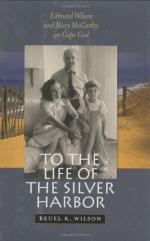|
This section contains 3,298 words (approx. 11 pages at 300 words per page) |

|
At the moment when Prosperity and the New Humanism were falling like twin meteors from portentous skies, Edmund Wilson published Axel's Castle. To all who could concern themselves with such matters, the arrival of a major new critic and a major literary idea was at once apparent…. Under the leadership of Paul Elmer More and Irving Babbitt, the New Humanists had been maintaining a tight little fort of well-defended doubt against the great American tide of good intentions, self-expression, and democratic sentiment. Axel's Castle, though it evidently derived many of its formulations from these battles, stood considerably apart from them. That Edmund Wilson was no disciple of the watery Whitman scarcely needed proving; the very conception of humanity en masse was alien to the queer inward energy and obscure allusive style of the authors whom he celebrated. But still less was he in Mr. More's rather hardbitten Greek...
|
This section contains 3,298 words (approx. 11 pages at 300 words per page) |

|


